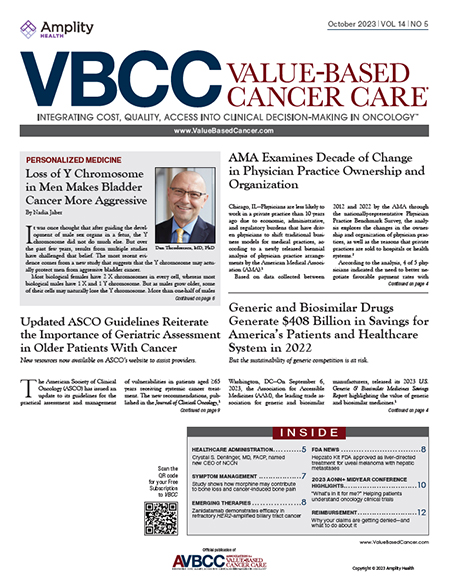Phase 1 data of ALLO-715 followed by lymphodepletion showed durable responses in heavily pretreated RRMM patients.
Although the development of novel chimeric antigen receptor (CAR) T-cell therapies has advanced the treatment landscape of relapsed/refractory multiple myeloma (RRMM), many patients may not benefit from these therapies due to access issues and resulting treatment delays. Single-dose allogeneic CAR T-cell products, which use T-cells from a healthy donor, may help address these challenges and ensure that eligible patients will benefit from therapy. ALLO-715 is a genetically modified anti–B-cell maturation antigen (BCMA) allogeneic CAR T-cell therapy that aims to reduce the risk of graft-versus-host disease (GvHD) and allow for the use of an anti-CD52 monoclonal antibody, ALLO-647, for selective lymphodepletion (LD). At the 2022 American Hematology Society meeting, Sham Mailankody presented results from part A of UNIVERSAL, a multicenter phase 1 trial evaluating ALLO-715 in patients with RRMM with a focus on dose level 3 (DL3: 320 × 106 CAR+ T-cells) following LD with 2 different ALLO-647–containing regimens of 39 mg (FCA39) or 60 mg (FCA60).
Eligible patients received more than 3 prior lines of therapy, including a proteasome inhibitor, immunomodulator, and anti-CD38 antibody, and were required to be refractory to their last treatment line. At data cutoff, 59 patients were enrolled and 54 received LD and were treated with ALLO-715. Cytokine release syndrome occurred in 52% of patients; most of the cases were low grade. Sixty-seven percent of patients experienced potential neurotoxicity events, and all were grade 1 or 2 with the exception of 1 case. Fifty-nine percent of patients experienced infections, with grade 3+ occurring in 30%. No GvHD events were observed with ALLO-715 following ALLO-647–containing LD regimens. Twenty-eight patients were included in the DL3 expansion cohort (320 × 106 CAR+ T-cells), which was considered the most active cell dose, followed by FCA39 (11 patients) and FCA60 (17 patients). Twenty-three patients were efficacy evaluable. After a median follow-up of 14.8 months, the overall response rate in both cohorts was 65% (64% in the FCA39 cohort and 67% in the FCA60 cohort). Responses were seen across subgroups including high-risk cytogenetics and extramedullary disease. The median duration of response was 8.3 months with FCA39 and 9.2 months with FCA60. In both cohorts, all patients who achieved a very good partial response or better achieved minimal residual disease negativity.
The results from part A of UNIVERSAL demonstrated durable responses with allogeneic CAR T-cell therapy and warrant further investigation of DL3 with FCA conditioning.
Reference
- Mailankody S, Matous JV, Liedtke M, et al. Universal updated phase 1 data highlights role of allogeneic anti-BCMA ALLO-715 therapy for relapsed/refractory multiple myeloma. Poster presented at: 2022 American Society of Hematology Annual Meeting; December 10-13; New Orleans, LA. Abstract 2019.


